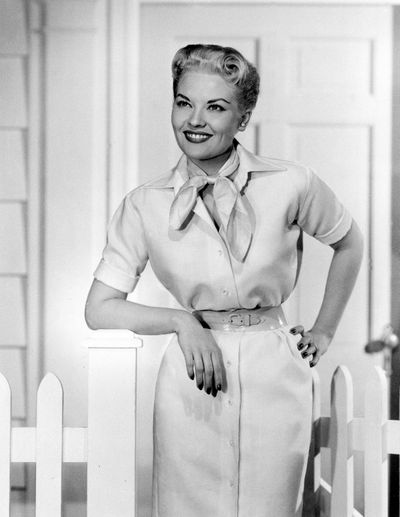Pop singer Patti Page dies at 85

Patti Page, the Oklahoma-born pop singer whose gossamer voice on “The Tennessee Waltz,” “The Doggie in the Window” and other 1950s hits offered a soothing counterpart to the revolutionary new sound of rock ‘n’ roll, died New Year’s Day in Encinitas, Calif., where she’d lived for several decades. She was 85.
No cause was announced, but her longtime personal manager, Michael Glynn, said she had been suffering from a heart ailment and lung disease.
Page helped bring country music to a broader audience in the late 1940s and early 1950s with smooth, elegantly produced recordings epitomized by “The Tennessee Waltz,” the simply expressed and achingly emotional tale of a woman who loses her sweetheart to an old friend at a dance.
It spent 13 weeks at No. 1 in Billboard in 1950, becoming one of the biggest hits of all time and selling more than 6 million copies. She landed nearly 100 records on the Billboard singles chart from 1948 through 1970, including “(How Much Is) The Doggie in the Window,” “Old Cape Cod,” “Allegheny Moon,” and, in her final Top 10 hit, the title song from the 1965 film “Hush … Hush, Sweet Charlotte.”
Following a lead established by Tennessee singer Eddy Arnold in the late 1940s, Page was able to reach beyond rural Southern audiences with recordings that betrayed no trace of her native Oklahoma twang and replaced steel guitars, fiddles and other traditional country instrumentation with a muted trumpet and orchestral violins as accompaniment.
While her elegant voice and easy-listening arrangements often recalled the golden age of big band singers of the 1930s and ’40s, she embraced new multitrack technology that allowed producers to layer her voice. She often not only sang the leads but provided her own harmonic accompaniment.
She was so popular that she became the only star to host TV shows on each of the three major broadcast networks in the 1950s, including “The Patti Page Show” on ABC.
The singer, who was born Clara Ann Fowler on Nov. 8, 1927, in Claremore, Okla., once said that music provided her with her own form of therapy.
“What I like about singing is that, for me, it’s a substitute for the psychiatrist’s couch,” she said. “I can tell it all in song: pathos, gladness, love, joy, unhappiness. Each song, you’re telling a story and acting.”